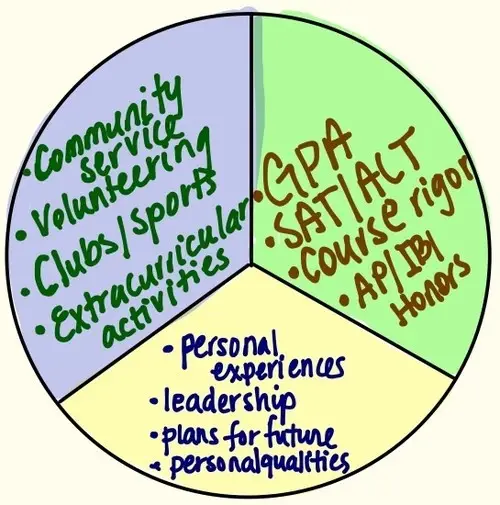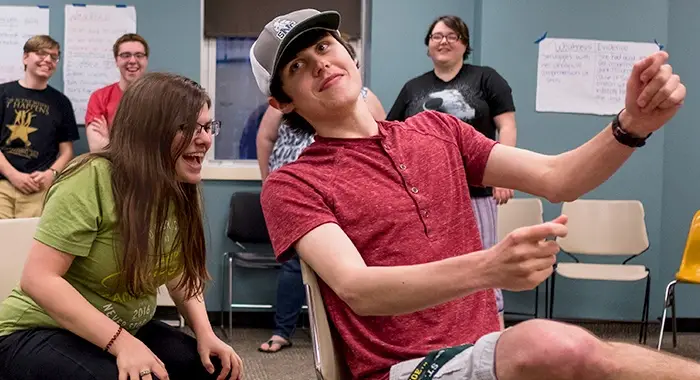HOW TO EXCEL IN A HOLISTIC COLLEGE ADMISSIONS PROCESS
HOW TO DIFFERENTIATE TWO STUDENTS WHEN THEY LOOK SO MUCH ALIKE

HOLISTIC COLLEGE ADMISSIONS AND ITS RELATIONSHIP TO “PERSONALITY”
You have heard the story about the valedictorian that didn’t get into some, or even all, of their schools. If “the best of the best” can’t make it, what about your daughter (or son) who is not the valedictorian? “What do they want from these kids?, I wouldn’t get into my school if I applied today! This whole college admissions process stinks!” These are just a few rants that you might offer to whoever is within earshot.
With top schools rejecting 80-95% of qualified applicants (as determined by GPA and SAT/ACT scores), there is certainly enough credible basis to be uncomfortable with the process. The irony is that there are more than enough colleges in the U.S. that will fit well for your son and daughter, but the upwardly mobile effort to get into the “best” schools is driving the continuance of disappointment for today’s applicants.
WHAT IS MEANT BY HOLISTIC ADMISSIONS?
Simply stated, holistic admissions is the usage of more than just metrics to determine admissions. GPA and test scores alone do not take into account other subjective factors like: diversity (geographic, racial, economic, sexual), application essays, recommendations, high school curriculum, legacy, extra-curriculars, college needs (maybe they want to boost computer science this year), etc.

The downside of a holistic review: It can promote bias, secretiveness, and distrust. It is easy to hide the real reason for rejections behind the word “holistic”. What is often heard is that, “we have so many qualified candidates, and we would like to accept them all. The parent is left wondering, why not my kid? If it was just the metrics alone, rejections would be easier to understand. It becomes complicated when top schools receive applications with perfect GPA’s and near perfect test scores. This raises questions about fairness. When you take the metrics out of the equation, there is less of an argument since no one really knows how a particular college makes their acceptance decisions.
The upside of a holistic review: A student who may not come from the top 1% or a major metropolitan area or the best high school can be judged on their individual and distinctive merits. Students who will contribute to the overall health and vitality of a campus can be recognized and rewarded, rather than the high scorers who may contribute only by scoring well on tests. A campus filled with vibrant, active and engaging students, not just those who are good test takers, will attract other such students onto campus.
Distinguishing students by “personality” is the answer to giving them the best possible chance of being admitted to even the best schools. Does the student have a “story”? She is the one who (Fill in the blank: helped with the senatorial campaign, created a fund me page for a new technology product, pulled that kid out of a burning car, won the national robotics competition, was the bat girl for the Red Sox, was on American Idol, etc.). The best stories, or “tags” are those that are genuine and unique

HOW TO GET TAGGED AND STAND OUT FROM THE PILE OF APPLICANTS —
IT’S NOT JUST ABOUT COMMUNITY SERVICE ANY MORE.
Since extracurriculars and/or specific diversity characteristics may not be enough to distinguish a student during the application process, how does one get “tagged”? My view is that a student can earn their tag by doing something outside of the mainstream; even something outside of school. Just a decade ago the “building homes in Nicaragua” approach was a distinctive community service tag. Community service programs have evolved into structured programs that you can sign up for, like a teen tour and over time have lost much of their “tag” value. With so many students planning their community service, it is hard to distinguish those that are genuine. It is not that community service is a bad thing; some students benefit greatly from their experience, but sometimes it is a bit forced. More important, when it is not as genuine, the college admissions community notices.
HOW MANY TAGS DO YOU NEED?
Decades ago, students were advised to be “well rounded”. To be an All-American was to do so many things – the more the better. To be captain of the football team and class president and a volunteer in the local nursing home was the ultimate. Then, about 15-20 years ago, it was all about being passionate about one thing and be great with that one thing. Sure in today’s world you can be “tagged” or “passionate” about many things, but sometimes the variety dilutes the strength of the impression and the secondary tags get lost. It is just unrealistic to think that someone can be active and excel in an abundance of activities.
WHAT ABOUT BEING A LEGACY?
Certainly, there are still some cases of legacy that may influence the admissions decision, but these are often only cemented with true personality as well as impressive tags. In today’s iphone driven world, those who can communicate well with others, (not always follow the path of others, and not be hampered by their age), can generate a distinct advantage. Those who already offer some notoriety provide promise for the college as well.
THE POWER OF THE ESSAY:
If your son or daughter wasn’t the best in the state for fencing and didn’t cure cancer over the summer, what can they do? Other than moving to Idaho to claim a geographic advantage, the greatest platform to showcase one’s personality is through the essays. Describing what was learned from a year- round job at a local business, as well as the learning and insight that occurred, can be valuable enough to distinguish a student.
SUMMARY:
Tags are as important as essays are. But, tags should not necessarily be repeated again in the essays. The key is that tags and essays must be genuine to help the best students with their admission efforts.
If you have a high school student and want to get started on the right path, contact us at 914-273-2353, nschwartz@collegeplanningofwestchester.com or visit us at: www.collegeplanningofwestchester.com






